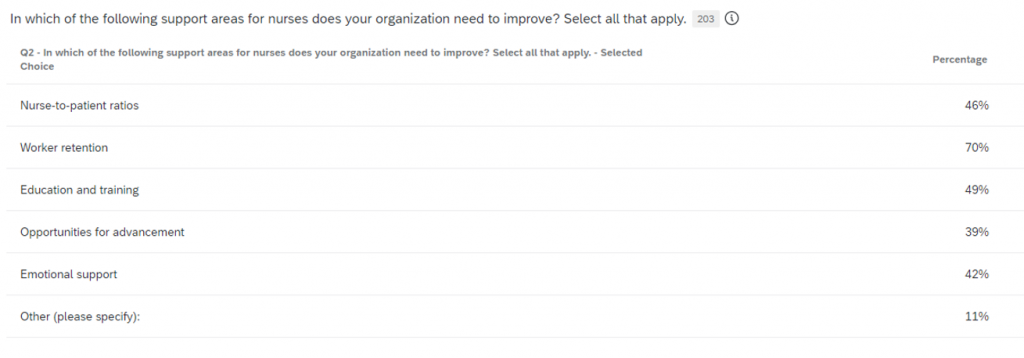PSQH Quick Poll 2024: Taking the Pulse of Nursing’s Impact on Patient Safety
By Jay Kumar
As part of National Nurses Week, PSQH reached out to our readers with a few questions about how nursing impacts patient safety and healthcare quality. The Quick Poll had a total of 207 respondents. The PSQH Quick Poll is presented in partnership with Collette Health and Drexel University.
Organizational support
Asked about organizational support for nurses, 58% of respondents said their organizations were somewhat effectively supporting nurses, while 24% chose very effectively, 17% said somewhat poorly, and 1% said very poorly.

Areas of support
Support can come in many forms. Asked about areas of support in which their organization needs to improve, 70% of respondents chose worker retention. This was followed by education and training (49%), nurse-to-patient ratios (46%), emotional support (42%), and opportunities for advancement (39%).
Other write-in responses included:
- Financial
- Psychological safety and culture
- Required overtime
- Nursing has very little voice anymore at my current institution
- Mid-level nursing management
- To have a stronger voice in the multiprofessional team
- Dietary
- IT inefficiencies
- Workplace violence training and support in outpatient environments
- Culture and recognizing nurses as equals of MDs and male leaders
- Better training
- Accountability
- Fairness
- Competency
- Off-service patient criteria and supports

Workplace violence
Asked about their level of concern about nurses being exposed to workplace violence, 53% of respondents said they were very concerned, 33% were somewhat concerned, and 14% were not concerned.

Consequences of medical errors
The RaDonda Vaught case raised concerns about the criminalization of medical errors. Asked if they were concerned about the consequences of making a medical error, 48% of respondents said they were somewhat concerned, 30% were very concerned, and 22% were not concerned.

Attracting new nurses
In the aftermath of the COVID-19 pandemic, healthcare leaders have voiced the need to improve recruitment of new nurses into the field. Asked how concerned they are about the nursing profession’s ability to attract new nurses, 56% of respondents said they were very concerned, 34% said they were somewhat concerned, and 10% said they were not concerned.

Those who were very or somewhat concerned were asked what should be done to bring new nurses into the profession and their write-in responses included the following:
- Improve benefits/pay; improve protection of nurses
- Look at workflows and explore new ways of working, reduce paperwork burden
- Better media coverage, public awareness, legislator awareness
- Governments need to add nursing to the endangered list; more funding needs to be made available for expansion/education of nurses
- National education campaigns that align with their current strategies, improvement in compensation to an acute care setting value, improved patient care ratios for CNAs
- Actively go into high schools and offer incentives
- Assigning mentors, more hands-on orientation
- Improved nurse-patient ratios and improved psychological safety
- More opportunities for growth and development, safe staffing ratios
- Stop portraying the job as a line of work fraught with challenges so they don’t come in with the expectation that it’s going to be awful
- Publicize the different areas of nursing. It’s not all bedside in the hospital.
- Improved tuition reimbursements/breaks and improved work environment
- New nurses choose not to work nights, weekends, and holidays. Many have grown up with an entitled attitude and no experience with personal responsibility. I am not sure how you fix that.
- Focus on the flexibility of the career of nursing
- Sign-on bonuses, preceptorship, leadership training
- I think you should incentivize the existing, experienced nurses in the organization
- Continue to increase salaries as able; flexible scheduling with less frequent weekend rotation (i.e., work every third or fourth weekend instead every other if possible)
- The orientation process needs to improve. Over the years, the orientation of new nurses has been scaled down. A well-designed orientation program improves nurse competency, satisfaction, and engagement.
- Offer more longevity pay and benefits that increase every year
- Public campaign about nurse abuse and efforts to mitigate it
- We need to understand the needs of the new generations and evaluate how we can adapt our needs
- Improve efforts to recognize and retain experienced RNs.
- Need to teach skills of dealing with people
- Reinstate preceptor programs and stop allowing senior nurses to fire nurses. Require nurse leaders to address the system factors leading to patient harm and nurses experiencing error.
- I don’t believe it’s so much attracting nurses as it is the caliber of people being attracted to the profession
- Recruitment should be honest about the specific requirements for being a nurse. Provide honest support to nursing students. Give more opportunities to see, work, experience what nursing is like to students in middle and high school.
- Retain senior nurses! Without effort to support and sustain experienced nurses, we will have no one left to support the new recruits.
- Create safer practices and laws that protect nurses from violence and any abuse. Treat nurses like people who have rights to protect themselves against violence without being penalized.
- More internships with home health. Longer orientation periods with slower progression of case loads.
- Unionize nurses in every state.
- The current focus for attracting new nurses is the money. This must stop because we are attracting the wrong people to the profession. People that are in just for the money to be made and not for the care of people. Focus needs to be more on the people/patient side.
- It seems harder to get employees to stay. It is so important to reward staff for their dedication to the facility. I also believe that COVID scared a lot of nurses out of the profession.
- We need to address the burnout level in more than physicians. We need to have manageable workloads for staff and leaders in ambulatory care as well.
![]()

